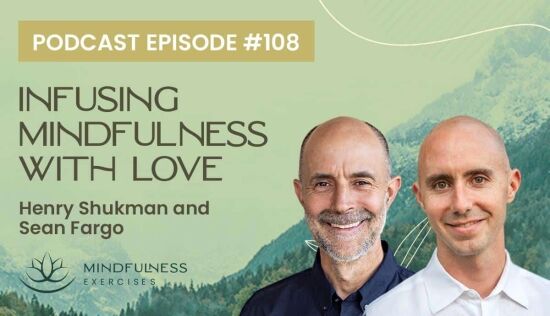Listen now

There are a great variety of mindfulness practices and there are benefits to each. They are not, however, the same. A complete mindfulness practice, one that leads to awakening, is not merely a training in paying attention, but in connection and love.
In this episode, Sean Fargo speaks with Zen teacher, author, and poet Henry Shukman on the benefits of meeting each moment with awareness and an open heart. Shukman’s most recent book, Original Love: The Four Inns On The Path Of Awakening, is an antidote to the suffering of our times, helping us heal from hyper-individualism, divisiveness and disconnection.
Sponsored by our Mindfulness Meditation Teacher Certification Program
MindfulnessExercises.com/Certify
What You’ll Learn in This Episode:
Show Notes:
The importance of heart-centered practice
Shukman’s latest book, Original Love, offers practical insight into the potential life change available when we meet each moment with an open heart. We can even apply this open heartedness when we’ve failed to act with kindness and compassion. Meeting our deficiencies, and those of the world, with love, helps us soften feelings of judgment and separateness.
The value of focused, long-term mindfulness training
Many of us dabble in the various mindfulness practices which we feel are easiest. Something is missed, however, when we avoid the challenge and hardship that can come with surrendering to a single, complete path. Shukman is clear that we need not all become monks, but that there’s a difference in those who have committed to a practice that involves yielding our autonomy for a while.
Four territories of meditation practice
In Shukman’s experience, there are four ‘inns’ or territories of practice and spiritual life, each with distinct purposes. The four inns of mindfulness, support, absorption and awakening are all valuable, but they are not the same. Some practices enhance mindfulness and emotional well-being, while others lead to a deeper, self-transcendent experience of awakening.
Avoiding pitfalls as our practice advances
As our meditation practice deepens, we may come to realize there’s no individual, unchanging, separate self to be found. Experiencing this merely as an intellectual construct, however, puts us at risk for nihilism, depression or even suicidal ideation. Shukman emphasizes the importance of balancing wisdom with compassion and heart-centered connection.
The role of love in mindfulness
Shukman presents the case for the role of love throughout each stage of our meditation practice, and each of the Four Inns. The partnership between mindfulness and love is perhaps most apparent in the practice of allowing. Accepting this moment, just as it is, requires a type of love.
Connection in meditation practice
Meditation is incomplete as a solitary practice, as we are not solitary beings. With practice, we recognize the deep interconnectedness of everyone and everything. This can be a source of comfort and connection, especially in times of loneliness. Shukman points out the realization of interconnectedness is not exclusive to Buddhist practice, but can be explored in psychotherapy, shamanism, animism, or dream work.
The ultimate experience of absorption
With meditation, we can experience states of deep concentration or absorption, sometimes referred to as Samadhi. Full immersion in the present moment goes beyond total clarity, as it includes an element of love. In the deepest state of presence, we need nothing else. We are in love with the truth of this experience, just as it is.
Favorite Quotes:
“One of my Zen teachers used to say the three most important things in practice are allowing, allowing, allowing. And that's been a watchword for me throughout my practice."
"Our being is so dependent on so many factors that have nothing to do with us. And so to be able to recognize in some small measure that I am being given this moment right here and now, which I call my life... but I'm being given it by 10 trillion trillion things. That is a balm for the solitary, the soul that feels alone."
“There’s talk of original nature—but original nature is love. Shunyata [emptiness] is love. One glimpse is so horrifying that compassion naturally arises, and one glimpse is so marvelous that compassion naturally arises."
"Everything is one mind-blowing force of love—an act of love. It’s all here—like this, now—all the trouble, brutality, etc. But still—the bare fact that experience is happening is nothing but love."
"Have contact with guides who have clearly been through it—that’s number one. When you meet someone who’s actually been through this, you realize it’s not an idea or abstract—but a human thing. To become awakened—great—but you need to learn from one who is awakened."
Additional Resources:
About Henry Shukman:
Henry Shukman is an author, poet and a teacher in the Sanbo Zen lineage. He has trained in various meditation schools and practices, and with Roshis John Gaynor, Joan Rieck, Ruben Habito, and Yamada Roshi, international abbot of Sanbo Zen, who ultimately appointed him a teacher in 2010. He has also been authorized to teach Mindfulness by Shinzen Young and is a certified dreamwork therapist.
Henry has taught meditation at Google, Harvard Business School, Esalen Institute, Colorado College, and United World College among other venues. He is the Spiritual Director Emeritus of Mountain Cloud Zen Center in Santa Fe, New Mexico and co-founder of The Way, a meditation app that guides users on a single pathway of training toward the deeper possibilities of meditation.
Henry has written several award-winning and bestselling books of poetry and fiction. His poems have been published in the New Yorker, Guardian, Sunday Times (UK) and London Review of Books, and his essays in The New York Times, Outside, Guardian and Tricycle. He has also taught poetry at the Institute of American Indian Arts and Oxford Brookes University and was a Royal Literary Fund Fellow of Poetry and Poet in Residence at the Wordsworth Trust. He has an MA from Cambridge, and an M.Litt. from St Andrews.